5 AdWords Mistakes You’re Probably Still Making
by Brenton Clive • August 3, 2016
Let’s face it, pay-per-click advertising is constantly changing and evolving. No matter how good you were at paid search advertising six months ago, things are different now.
As a result, you’re probably making a few AdWords mistakes that are keeping your campaigns from succeeding the way you’d like.
At Disruptive Advertising, we audit a lot of AdWords accounts, so we’ve got a pretty good feel for the mistakes AdWords advertisers are making.
So, to help you out, I thought I’d put together a quick list of 5 mistakes you (and most advertisers) seem to still be making in AdWords.
AdWord Mistake #1 – Bidding on Too Many Keywords
Often, advertisers think they need to bid on every word that might—in any possible way—be related to their product or service (and often a whole bunch of words that are non-related too).
After all, you don’t want to miss out on potential business, right?
On the surface, this seems like a good idea. The only problem is, 94% of keywords never produce conversions and those useless keywords eat up 76% of your AdWords budget.
To make matters worse, as this list grows so does the complexity of your campaigns. In many cases, keyword lists are so huge that they have literally thousands of keywords that aren’t even receiving impressions.
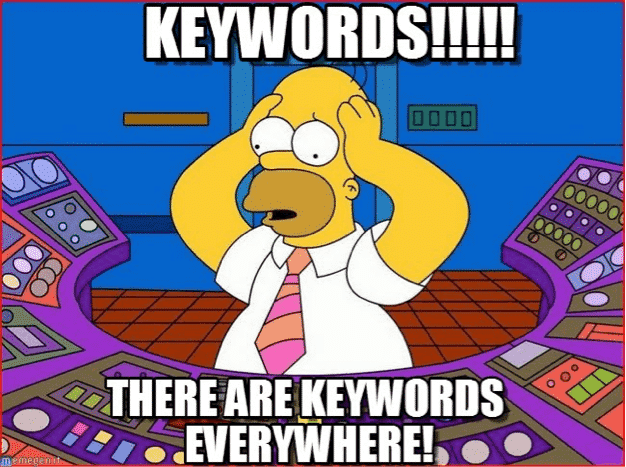
On the other hand, if you can cut your keyword list down to the top 10-15 keywords that bring in the most profit or are most relevant to your product or service, you can cut a ton of wasted ad spend from your budget.
Then, once your ads are performing well on those keywords, you can begin to slowly, methodically expand your keyword list.
Now, don’t go crazy and bid on a bunch of new keywords. Instead, identify search terms that are already driving results and build campaigns and ads around those terms.
If you choose your keywords wisely and limit your keyword list to keywords that actually produce results, you’ll be able to make strategic decisions that allow you to get the most out of your budget.
AdWords Mistake #2 – Writing Too Many Ads
Along the same lines, you don’t need 10+ ads in every ad group. When it comes to AdWords, simplicity is the name of the game.
More ads doesn’t equal more clicks and conversions, it equals more work for you.

That being said, having multiple ads in each ad group is the best way to run an AdWords campaign. After all, if you aren’t testing different things then you’ll never know what works best.
But, what people don’t understand is that it’s important to have a happy medium between ads and data.
The biggest advantage online advertising has over other mediums is the fact that you can collect data in real time and use that data to make real decisions.
Imagine that, your advertising campaigns can actually get better over time.
However, all that data isn’t very useful if you’ve spread it across so many ads that you can’t tell what’s working and what isn’t.
The exact number of ads that you should create will depend on your budget and traffic, but you want to create enough ads that you can get usable data in a reasonable time frame. Then, once you have that data, you can create new ads based off of what worked best.
In other words, instead of testing a dozen ads in every ad group, test 2-4 ads, look at your data and use what you learned to come up with a new set of 2-4 ads to test.
It’s simple, easy and it will get you better results faster than trying to simultaneously test every ad you can dream of.
AdWords Mistake #3 – Only Using AdWords
When it comes to online search, one thing is clear, Google is king.
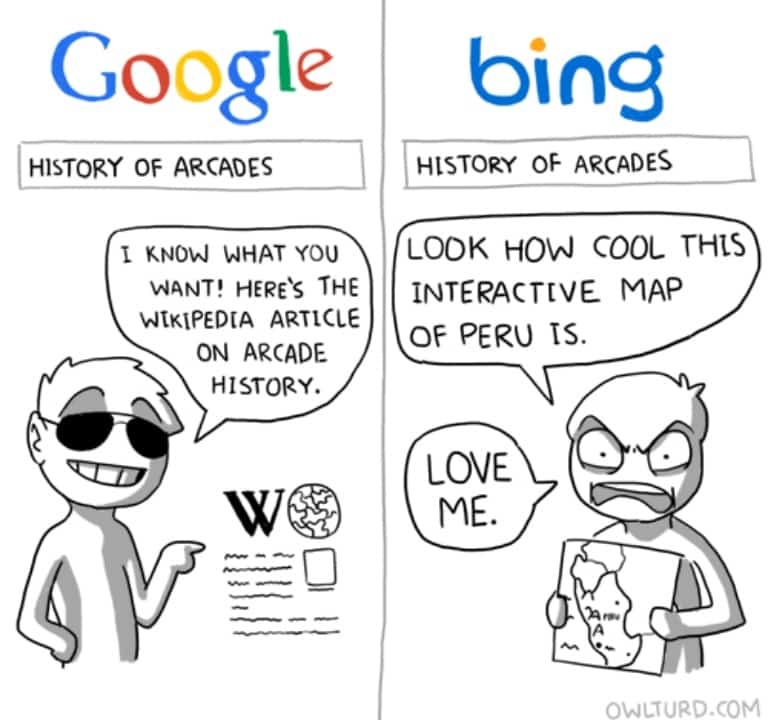
However, that doesn’t mean that Google has to be your one and only paid search platform. It’s okay to explore your options.
Other platforms like Bing or social media outlets like Facebook or LinkedIn can be just as effective—if not more effective—than AdWords.
Here are a few reasons to consider other advertising platforms:
- Bing isn’t used as much as AdWords, so you’ll have less competition if you advertise on Bing. Less competition means you pay less for clicks which equates to more bang for your buck.
- Facebook offers enhanced audience targeting which means you can target the people you know are going to want your product instead of waiting for them to come to you.
- LinkedIn offers highly targeted advertising for reaching business professionals allowing advertisers to effectively market on the B2B landscape.
Every advertising platform has unique opportunities and limitations. So, if you’re only using AdWords, there’s a good chance that you’re selling your business short.
AdWords Mistake #4 – Relying on CPC/CTR
So many marketers talk about cost-per-click (CPC) and click-through-rate (CTR) when referring to a campaign’s performance.
CPC and CTR are definitely an interesting part of campaign performance, but many marketers think that lots of ad clicks with a low cost-per-click mean the campaign must be performing well.
However, what people do after they click on your ads is just as important as whether or not they click on your ads.
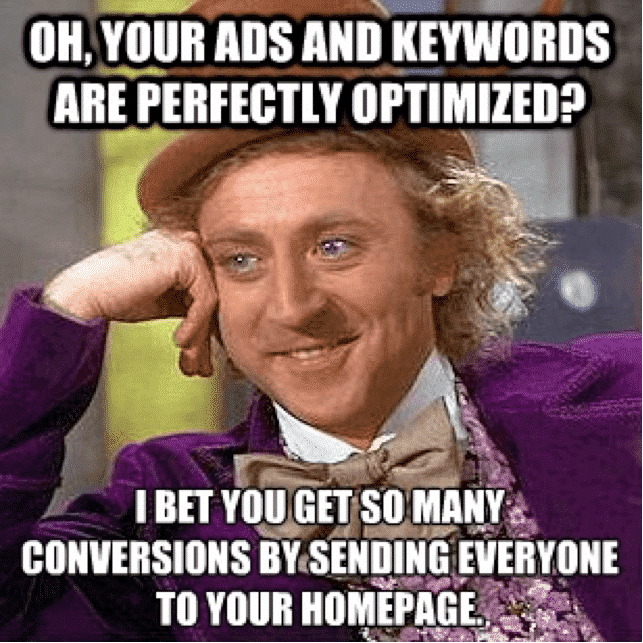
You can’t measure campaign performance if you don’t know which clicks are actually turning into conversions and closed sales. That’s like saying everyone compliments you on your lemonade stand when you haven’t actually sold any lemonade.
The fact that people click on your ads doesn’t mean that your advertising is profitable.
That’s why I always look to a campaign’s cost-per-acquisition (CPA) when determining profitability. CPA tells you whether or not your ads are putting the right people on your page and how those people are interacting with your landing page.
By focusing on CPA, you can eliminate a lot of budget-consuming keywords which aren’t providing any real profit to your bottom line.
AdWords Mistake #5 – Overusing DKI
Dynamic Keyword Insertion (DKI) can be a great way to share a specialized message based on specific searches. Used correctly, DKI creates extremely personalized headlines for people in your target market.
However, if you aren’t smart about DKI, things can go awry…
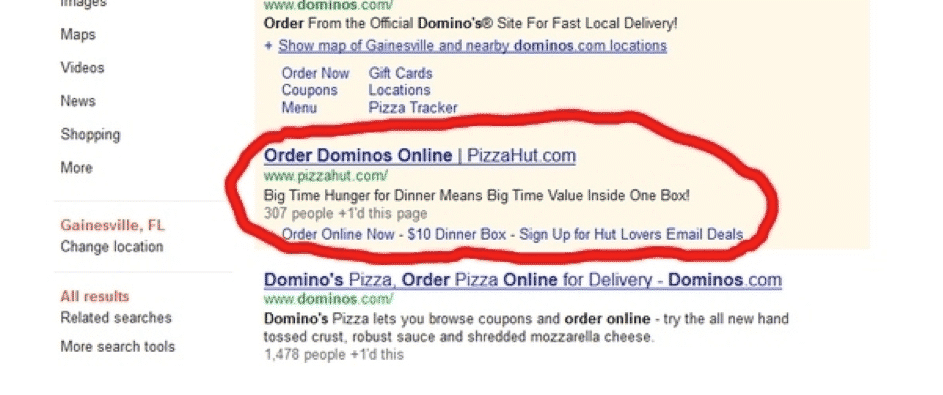
Perhaps the biggest mistake an advertiser can make when writing ad copy is using DKI for all of their ads and over bidding on too many keywords. Bidding on non-relevant keywords will yield ads that either don’t make sense or will give you clicks that will never convert.
Worse still, you can show up for misspelled keywords which would mean your ad headline would contain spelling errors.
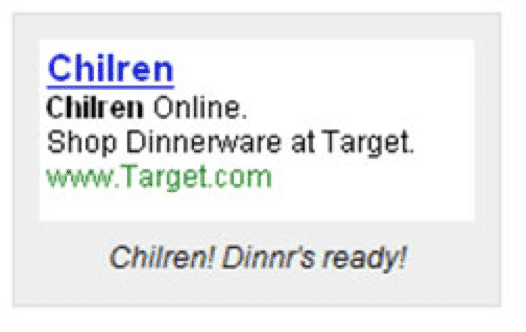
In general, most advertisers would be better off writing well-crafted ads than using DKI.
And, even if DKI seems like the right route for your ads, it’s important to be incredibly thoughtful as your write your ads and keep a close eye on your ads to make sure that your ad copy actually makes sense.
Conclusion
Fortunately, while these 5 AdWords mistakes are fairly common, you can quickly fix them with a little extra time and effort.
Whether you’ve got too many keywords and ads or you’ve been using DKI to shortcut around writing great ad copy, taking the time to fix these mistakes will greatly improve the profitability of your campaigns.
By the way, if you’d like me to take a look at your AdWords account and help you identify ways to improve performance, let me know here or in the comments!
How have you seen these AdWords mistakes affect account performance? Are there any other common AdWords mistakes you’d add to this list?





